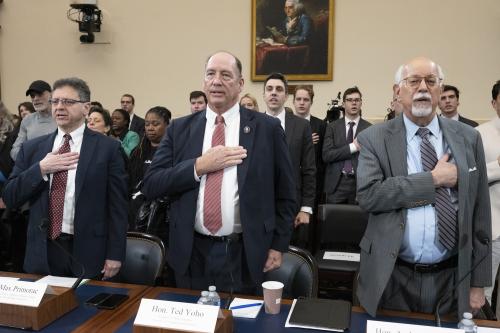The historic meeting between Taiwan President Ma Ying-jeou and Chinese President Xi Jinping in Singapore this past Saturday has come and gone. It was historic: The most recent near-precedent—Chiang Kai-shek and Mao Zedong in Chongqing—occurred in 1945. Generally, heads of state or government do not meet unless each sees a value of doing so at minimum risk, and only if there is a degree of trust between the two.
The encounter had a significant symbolic component, but that’s alright—symbols can create substance. I don’t know whether the Xi-Ma meeting will change the results of Taiwan’s presidential and legislative elections on January 16th; in fact, we may never know the true impact.
I can say a bit more about the effect on cross-Strait relations, drawing on the most important statements released after the summit. A Xinhua news agency account of the meetings authoritatively conveyed Xi’s view. Ma spoke at a post-meeting press conference. And Tsai Ing-wen, the candidate of the Democratic Progressive Party (DPP) who hovered like a dark cloud over the proceedings, made her own statement. What is noteworthy, but not remarkable, about each of these efforts to frame the meeting was that they broke little or no new ground.
Holding the family together
Xi Jinping enveloped his remarks (translated by the Xinhua Domestic Service) with appeals to ethnic solidarity and national unity. His message was that the people of the Chinese Mainland and the people of Taiwan are in fact one big happy family and the differences of the past do not negate that fact. The sort of cooperation that has existed during the time of the Ma administration has strengthened those bonds. Moreover, ending the political division between the two sides of the Strait is critical for his larger task of rejuvenating the Chinese nation and restoring it to its proper place in the world. For Xi, a divided country is by definition a weak country.
These ethnic and nationalistic appeals, which Xi has made since he came to power in 2012, have a long history and make sense within Chinese domestic politics. But they likely ring hollow among at least some in Taiwan. The “Taiwan family” remains quite divided between the descendants of Chinese who moved to Taiwan from the seventeenth century on (the “native Taiwanese”) and the “Mainlanders” who came with Chiang Kai-shek and his Nationalist Party (Kuomintang, or KMT) after World War II. Many Taiwanese remember the KMT’s harsh rule from then until the 1980s. For them, being part of Xi’s kind of Chinese nation has little attraction. Moreover, many in Taiwan draw a sharp distinction between the authoritarian political system on the Mainland and their own democratic system. Reliable polls by Taiwan’s National Chengchi University show that the share of the population that actually favors political unification is quite low.
For Xi, a divided country is by definition a weak country.
On the upcoming election in Taiwan, Xi identified two paths that the new Taiwan government might take. One is to continue to follow what Beijing calls the path of the “peaceful development” The other is the path of renewed “confrontation,” “separation,” and zero-sum hostility. Which path China will allow Taiwan to take will depend on whether Taipei “unwaveringly adheres to the common political foundation between the two sides of the Strait,” based on the 1992 consensus and opposition to “Taiwan independence.” Without this “magic compass that calms the sea,” Xi warned, “the ship of peaceful development will meet with great waves and even suffer total loss.”
This warning was aimed squarely at the DPP and Tsai Ing-wen, who—polls indicate—is likely to win the presidency in two months. Xi conveyed a willingness to overlook the DPP’s past positions and actions, but only if it identified with “the core connotation of the 1992 consensus.” Xi also expressed the limits of his tolerance, saying:
“At present, the greatest real threat to the peaceful development of cross-Strait relations is the ‘Taiwan independence’ force [code for the DPP] and its splittist activities. The ‘Taiwan independence advocates’ instigate hostility and confrontation between the two sides of the Strait, harm the state sovereignty and territorial integrity, undermine peace and stability…which will only bring disastrous consequences to the compatriots on the two sides of the Strait.”
For Xi, it seems, no third option exists.
None of this is really new. The “two paths” is a staple of People’s Republic of China efforts to try to shape Taiwan’s electoral outcomes. The subtext here is that Beijing, having stated the principles that Taiwan must follow, will not be responsible for the consequences if the new government chooses what Xi calls the path of “disaster.” That is, because Beijing believes it has captured the moral high ground, any actions it takes will be justified. But is it smart for Beijing to effectively back itself into a political corner this way, offending at least 45 percent of the Taiwan public (and probably a majority)?
Wish list
I turn now to Ma Ying-jeou. His focus in his meeting with Xi Jinping was the “consolidation of 1992 consensus and maintenance of peace across the Taiwan Strait.” It should be no surprise that he, like Xi, stressed the 1992 consensus: It helped make possible the considerable achievements of his administration at little cost to Taiwan. Tsai Ing-wen, in contrast, has so far not accepted the 1992 consensus. Ma may be forgiven, therefore, for fearing that much of what he accomplished could be for naught if Tsai reverses course.
Ma said that he raised four areas of concern in his meeting with Xi.
- The first was mutual hostility and the need to resolve disputes peacefully. He focused on China’s unremitting efforts to exclude Taiwan participation in the work of international non-governmental organizations.
- Second, Ma spoke of the Taiwan people’s concern about China’s growing military capabilities and its deployment in ways that threatened Taiwan.
- Third, he stressed Taiwan’s desire to participate in efforts at regional economic integration, from which it had been excluded because of Chinese opposition.
- And fourth, Ma stressed the need for patience. There are issues that “the two sides cannot solve overnight,” and haste would make matters worse. (Reportedly, Ma also asked Xi for progress on the signature initiative of his second term: that the organizations on each side that conduct cross-Strait relations daily be able to establish a branch office in the capital of the other.)
None of these specific issues are new. Ma had hoped that the improvement of cross-Strait economics that had he engineered would yield Chinese goodwill on international participation, military security, regional economic integration, and representative offices, but to little avail. This is likely because Xi has deferred to agencies such as the ministries of foreign affairs, national defense, trade, and public security to make those calls.
Hearts and minds
Xi responded to each of Ma’s requests in noncommittal ways. The only practical result of the meeting was a commitment to establish a hotline between the agencies of the two governments responsible for cross-Strait policy. But the experience of the U.S. government is that even if hotlines exist, the Chinese side does not always wish to use them.
The lesson Taiwan voters might draw from all of this is that reassuring and accommodating China on its key issues brings no progress on matters Taiwan’s important ones. As Ma stressed:
“How cross-Strait relations develop in the future will have to take into account the direction of public opinion…cross-Strait relations should be built on the foundation of dignity, respect, sincerity, and goodwill, for only then can we shorten the psychological gap between the two sides.”
The implication of this statement is that China undermined its own goals by not doing enough to win the hearts and minds of Taiwan people.
Tsai Ing-wen made a short comment after the Singapore meeting. She criticized Ma for his failure in: “guaranteeing the 23 million Taiwanese’ right to choose; not set[ting] political preconditions in the cross-strait relationship; and attain[ing] equal respect.” Her recurring reference to the right of Taiwan people to choose reflected the paramount emphasis she places on the island’s democratic system. Her objection to “political preconditions” was an obvious reference to the 1992 consensus. Again, none of this was new—it’s all consistent with the principal themes of her campaign (along with her declared commitment to maintain the status quo as she defines it).
A three-way Venn diagram
There is some overlap in these three statements. Xi and Ma agree on the importance of the 1992 consensus, and Ma and Tsai agree that the Taiwan public should and does have a say on cross-Strait policy.
Xi and Tsai, however, agree on nothing. This has the makings of a serious stand-off if Tsai wins the election. Xi seeks to set the basic terms of future cross-Strait relations in ways that Tsai cannot accept and demonizes her and her party for being the “Taiwan independence force.” Does he understand that he may be strengthening Tsai’s position rather than weakening it? Tsai speaks of democracy, transparency, and sustaining the status quo, but only in general terms. Is she willing to run risks for Taiwan if Xi means what he says? Even if it is premature for Xi and Tsai to accommodate to each other now, can they find the political will after January 16th to reach some degree of mutual accommodation? In the balance, it seems, hangs the legacy of Ma Ying-jeou.
The Brookings Institution is committed to quality, independence, and impact.
We are supported by a diverse array of funders. In line with our values and policies, each Brookings publication represents the sole views of its author(s).



Commentary
What the historic Ma-Xi meeting could mean for cross-Strait relations
November 9, 2015